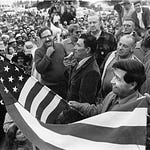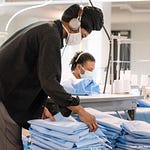The founder of Remake discusses PayUp, California Senate Bill 62 and how years of pushing for change from within corporations and the UN led her to the realization that accountability will be ensured only when garment workers have a seat at the table.
CHRISTIAN: I’m here with my dear friend Ayesha Barenblat, who has lived many lives in the apparel industry and recently led an impactful campaign called PayUp.
Ayesha, welcome. I’d love for you to start with PayUp; what is it and why is it so important?
AYESHA: Hi Christian, I’m so delighted to be here.
In terms of PayUp, as you know, Remake is an advocacy organization focused on making fashion a force for good–and one of the core tenants of our work is to push for transparency and accountability when it comes to this $2.4 trillion industry that is mostly deregulated. At the start of Covid, our network of supplier partners, factories and worker organizations started to report that brands were en masse cancelling orders.
For people less familiar with the fashion industry, it mostly operates on debt. Factories take on the fabric liability, they put in the wages, and then once a product is shipped, it can take 60, 90, 120 days to get paid. Starting in March, we were sheltering in place, everyone was in sweatpants and ecommerce sales were sluggish. So fashion brands thought well, how can we assure supply chain savings? They did so by essentially saying–those goods we ordered? We don’t want them.
If you think about the people who make our clothes, who already live paycheck to paycheck, putting untold hundreds of thousands of hours to make product, and then going into factories where either your pay is being docked or you are simply told that you are being furloughed because there’s no money… it’s really a humanitarian crisis.
In a nutshell, PayUp is about good business practices, not charity. The fashion industry cancelled upwards of $40 billion in goods that were either fully produced or in production at the start of the pandemic. And through relentless campaigning, working across union groups, labor groups and other campaigning groups, we have at this point recouped $22 billion of that $40 billion. So PayUp is really an example of worker and citizen solidarity to do what’s right.
The fashion industry cancelled upwards of $40 billion in goods that were either fully produced or in production at the start of the pandemic.
CHRISTIAN: I want to dive into that. We saw brands that were consumer-facing struggling, we saw retail bankruptcies, brands’ numbers falling off a cliff–but what we didn’t see were the downstream effects. Garment workers, by and large, have remained invisible to consumers.
Forty billion dollars is a tremendous amount of money. I think there was already some tension between factory owners wanting to do well by their workers, wanting to do well for themselves and at the same time being squeezed by brands. They’d either paid wages or committed to pay wages without the money to follow through. What was the response from the manufacturing side of the industry to this campaign?
AYESHA: To your first comment about the makers of our clothes remaining invisible–that’s really why I formed Remake. I’ve had the privilege of getting to know the amazing, fierce feminists at the other end (I say feminists because primarily it’s a women of color population that’s often forgotten) and it was striking to see, even when it came to media reporting, how we were hearing about bankruptcies, about perhaps the inability for big retailers to pay for their leases and retail operations, about what this meant for shareholders, but there was very little on the worker reports of hunger or the state-sponsored violence against them as they were protesting outside for money that was legally owed to them. Meanwhile, as earnings reports started to come in, you saw that shareholders did just great, and even brands filing for bankruptcy were essentially making sure that their executives were paid before their suppliers–and forget about workers. So I think the inequity that we are tending to see with this supercharged capitalism–unchecked, unregulated–really made people angry across the globe. I think that was part of the secret sauce that made PayUp so successful; we had warehouse workers and retailers from places like Urban Outfitters saying, “Yes, it’s a terrible place for us to work with, and now we’re really angry because they continue not to pay up.” What was interesting for us is that we tend to mostly work with worker organizations–labor organizations, union organizations–and this was the first time that suppliers were really on our side as well. What this pandemic and brand behavior really showed was the power asymmetry, the power dynamics between brands and suppliers. This is a largely illiquid industry; a lot of suppliers were out the fabric liability, they had to make payroll and, in places like Bangladesh, executive bonuses had to be paid. Suddenly they’re begging six, seven, nine months into the pandemic, “Can you please just pay for the purchase orders in place?” Covid has cracked open the injustice and, in many ways, the racism that’s embedded in the fashion system. You look at some of the largest brands in Europe or the US, and they did alright financially; some of them even made a profit. But I think what people need to understand is that it was done on the backs of the people who brought their product to life.
CHRISTIAN: What are the continued consequences of that? You’ve got $22 billion in commitments to pay for orders. First of all, have those been paid? And secondly, even if they were paid, what has been the continued impact you’re seeing on workers?
AYESHA: When people were super excited about PayUp and declaring victory–there were a lot of brands in the early days who were absolutely not going to move, or brands like Gap who were in financial trouble themselves, and we were able to move them–so it’s not to undercut the importance of the success of the campaign… money did get directly in the hands of workers, and we know from supplier partners that it meant that they were able to weather at least the spring and summer. But as we look to the fall, Mark Anner over at Penn State University has done some really important and telling research, revealing how brands have gone back in many ways to their bad behavior. So you continue to have brands that have still not paid up, brands like I mentioned, like an Urban Outfitters or those who are in financial crisis themselves, like a Kohl’s or a JC Penney. For those brands, the fight continues.
But there is another disturbing trend beyond order cancellations; we’re seeing a lot of downward pressure in price. Globally, brands are asking for upwards of 12 percent retroactive discount across product that is being shipped. If you understand the thin margins that this industry operates on, we have suppliers saying, “Essentially, brands are asking us to make the product for free. And because we need the continuity of business and for our factories to just keep running, we are in the untenable position of having our back against the wall to take these orders for whatever discounts.”
We’re seeing a lot of downward pressure in price. Globally, brands are asking for upwards of 12 percent retroactive discount across product that is being shipped. If you understand the thin margins that this industry operates on, we have suppliers saying, “Essentially, brands are asking us to make the product for free.”
CHRISTIAN: I just want to reiterate this. Factories are at best running on very small margins, single-digits is fairly standard. So to ask a brand to go 12 percent lower very likely puts them where they’re producing at a loss..!
AYESHA: Exactly.
CHRISTIAN: But they’re doing it because they feel like they don’t have another option, and it keeps operations running even if they’re losing money.
AYESHA: That’s exactly right. The other disturbing trend here is that in this Amazon one-click prime world where everyone is suddenly used to their goods arriving very quickly, we’re hearing from factories of this pressure to produce quickly. Now remember, it’s Covid (even though fashion brands have somehow worked with producing countries to declare factory workers essential workers who must produce even if they’re not making PPE) and lead times average 10, 12, 15 days during the holiday rush–so what this means from a health and safety standpoint is a disaster. Workers are reporting an inability to wash their hands, not wanting to wear masks because the factories are very hot and this pressure to hurry up because you’re already in a pressure cooker situation. So what we’re seeing from Sri Lanka to Los Angeles is Covid outbreaks in factories. People who don’t have safety nets, likely not an ability to get tested, let alone healthcare. You’ve got the safety implications of rush, you’ve got the price pressures, which means we’re directly seeing perfect implications from a wage-theft standpoint; factories are finding legal and illegal ways to not pay workers what they’re owed. A person in Ethiopia makes $24/month. In Bangladesh it’s somewhere closer to $96/month. These are people who already live paycheck to paycheck without savings. Recent studies through the Worker Rights Consortium are showing hunger across the industry, workers deciding whether to eat two meals or one, an inability to buy eggs or protein for their families. The profitability of brands, the ability to handsomely reward their shareholders–it’s being done at the expense of people who can’t put food on the table.
Recent studies are showing hunger across the industry, workers deciding whether to eat two meals or one, an inability to buy protein for their families. The profitability of brands, the ability to handsomely reward their shareholders–it’s being done at the expense of people who can’t put food on the table.
CHRISTIAN: There’s only so much money being made. I keep coming back to the importance of recognizing that; there’s not unlimited profit. In the impact investing world, in this stakeholder capitalism, there’s this idea that somehow we’re going to be able to pay out to shareholders as much money as they’ve been making, and pay even more to the supply chain. There may be success stories where that is possible, but there are a lot of businesses where there’s a finite amount of profit.
AYESHA: Completely.
CHRISTIAN: And what you’re talking about is when that profit isn’t distributed, hmm..
AYESHA: …equitably.
CHRISTIAN: Yes, equitably.
AYESHA: Look, when it comes to the fashion industry–whether luxury, high street or ultra-fast fashion–the downward pressure in price was already happening. Our clothes were coming to us cheaper and faster. We’ve been trained that product is disposable. If you have a $10 dress, you know there’s exploitation happening somewhere; the only variable in that equation is the human capital and the ways to depress it… which is exactly what we’re seeing. One of the issues beyond wages that’s often not seen is the gender-based violence. You’ve been in factories, you know it’s a high-intensity situation of let’s turn out products sooner, faster. When supervisors have their backs against the wall, they resort to a lot of verbal and physical abuse, and most of the people sitting on the assembly floor happen to be women. So that’s the other thing that we’re picking up on–a rise in gender-based violence in order to get product to us this cheap, this fast during a pandemic.
CHRISTIAN: You see across factories men in positions of power and women making up the majority of the workforce.
AYESHA: And without being promoted to positions of power. You see the same even on the union side. How is it that this industry that’s widely profitable mostly because of womenswear, that’s sold to us and marketed by women, that’s made by women.. how is it that it continues to be run mostly by men?
CHRISTIAN: I want to take a step back at this point; we could talk all day about issues in the industry, but really what you’re working on is how to solve them. You’ve taken different approaches that led you to Remake in its current form. As someone who’s trying to create the most positive impact, how did you arrive at Remake?
AYESHA: It’s a nice time in the year to reflect on your life’s work, isn’t it, so I appreciate that question. I really think of my own position of privilege as a Pakistani first-generation immigrant to use my voice to make a difference for women who look like me, who bring our fashion to life. She is my end customer, and I have tried in many many ways to make sure that at the end of the day her life is better off. Coming out of graduate school, where I got a degree in public policy (UC Berkeley, home of United Students Against Sweatshops–really embraced my radical roots there), it was the early days of corporate responsibility and sustainability. In some ways we were taught this myth, right, that the private sector, whether from the goodness of their hearts or reputational risk or because we can have this winners take all mentality of “it’s going to be good for workers, it’s going to be good for business, business is going to save the world.” And business has a role. But working from within one of the largest consultancies, running the fashion vertical, working across high street brands, luxury brands and discount brands to make the business case for investing in workers’ lives– the minute we got to the hard stuff, we would hit a roadblock. I’ve written Nike’s corporate responsibility report, I’ve sat across from Levi’s telling them why they must invest in the health and well-being of workers, I’ve looked to Gap around how you can empower people within your supply chain. And honestly, seven years in, I was really disillusioned. Because what we weren’t seeing was improvement in wages or the ability for brands to make a substantive difference when it came to addressing their core business practices. At the end of the day really, it just comes down to money. All the pretty marketing around what brands are doing from a training standpoint, or investing in workers’ well-being… I really came to the conclusion that it’s window dressing. Unless we get to purchasing practices and how product is fundamentally sourced and produced, we’re not going to make progress; what we need is regulation. Which is why I then went on to work within the International Labor Organization (part of the UN system) to say well, policy, right, if we get brands, unions, government to the table, we’re going to make a difference. But even within the tripartite structure, you realize that workers are often the weakest link. At the end of the day, the employers–the factories and brands–are the ones with all the power and that tend to always win.
When Rana Plaza fell down, the biggest industrial disaster of our lifetime, it felt very personal; the Ali Enterprise factory fire had just happened in my hometown of Karachi. It took days to pull the young women from the wreckage. For what? For making children’s pajamas for $9.99? I thought: we need an uprising. We need a movement of concerned citizens who are getting policymakers to do their jobs, to essentially hold this industry to account, because making the business case and working within the bureaucracy of a multilateral setting were simply not going to bring change soon enough.
That really was the genesis of Remake. We do a lot of education work on campuses, and I often hold an informal survey with graduate students and undergrads on who they think is going to make the most difference in the world. Across the board, people say companies; companies are going to save the world. Or they talk about consumers; consumers are going to somehow consume our way into a sustainable future. But what we’re not teaching young people is to really understand that a lot of the legal protections, a lot of the wins we’ve had, are really thanks to the labor movement. Americans hate unions, but the progress we’ve made is really thanks to them, and if we are to truly get this fashion industry under control, the silver bullet for me is regulation.
But what we’re not teaching young people is that a lot of the legal protections, a lot of the wins we’ve had, are really thanks to the labor movement. Americans hate unions, but the progress we’ve made is really thanks to them, and if we are to truly get this fashion industry under control, the silver bullet for me is regulation.
In order for us to get there, we need for us as everyday people, beyond just voting in the federal elections, to really engage at a local state level. I’d encourage us to think of ourselves as citizens rather than as consumers in order to build the type of world that we want.
CHRISTIAN: That leads into one of the next things you’re working on at Remake, which has to do with proposed legislation in CA. Before we talk about the bill, can you set the stage for what it means to be an apparel worker in LA?
AYESHA: You know, I’ve always been struck by the two most consistent things I hear at press appearances or when I’m teaching at colleges. People are like, “First of all, you mean robots don’t make our clothes?” There’s just little understanding that it’s women, mostly women, who make our clothes. And then there’s this perception–I think especially now, when nativism is so alive and kicking and we feel like we’re going to hearken back to our manufacturing roots here in the US–that somehow if it’s made in the US, it’s ethical and sustainable. That frankly is a myth that a lot of locally produced brands have fed us.
The reason we’re so focused on LA is that it’s the largest manufacturing hub. We don’t do much production in the US anymore, but the little bits that we do happen here in LA, where there are upwards of 45,000 people part of a formal workforce and a much larger underbelly of undocumented workforce. She happens to be mostly from Mexico or Central America, though workers come from as far as Indonesia. She relies on that income to support her family and to try to lift herself out of poverty. It’s a largely mixed-immigration workforce, which I think is important for people to understand, because as you’ve seen contraction in manufacturing, people often ask, “Well in LA, can’t you just get unemployment benefits?” and you have to remember the immigration culture and how scary that is. These are people who, during these outbreaks, have often had no medical recourse, no benefits.
The other thing to know about LA is that, unlike other parts of the world where there’s a minimum wage, we operate in a piece-rate system. That means you take home what you can make, and most of that is far below minimum wage. The typical rate for mask production here is three cents, four cents a mask; the average worker in LA’s take-home pay is $200. These are not wonderful, ethical jobs. Yet LA has so much opportunity; you’ve got the creative industry, the modeling industry, up-and-coming designers, ethical brands. So if LA was to become the sustainable capital for fashion in the US, we’ve got to clean this up. Because from a production standpoint, it’s predominantly a sweatshop market.
CHRISTIAN: Ok, so the way this is structured is that there’s no minimum wage; manufacturers are allowed to pay you at a rate per piece that you produce, and those rates are often set so low that no matter how efficient of a machine operator you are, you’ll never reach a level that allows you to sustain yourself. What you’re working on is putting in place a minimum wage. You wouldn’t think it would be this hard.
In the garment industry in LA there’s no minimum wage; manufacturers are allowed to pay you at a rate per piece that you produce. And those rates are often set so low that no matter how efficient of a machine operator you are, you’ll never reach a level that allows you to sustain yourself.
AYESHA: In the US, so many service jobs are just not good jobs. You look at the take-home pay of an average waitress and you have to rely on tips. The only ask here for the garment industry is a minimum wage; this is not an outlandish request. We love to point fingers at other sourcing countries with sweatshops, but we have them right here. And the industry–predominantly Fashion Nova, one of the biggest brands sourcing out of LA–has sort of couched this bill, which has been written primarily by garment makers and spearheaded by the Garment Worker Center, as a job-killer bill. But you have to understand, these are not good jobs. There are sustainable brands trying to do the right thing, versus some of these predatory brands that use the dehumanization of this workforce to bring us disposable, ultra-fast fashion.
So we’ve already tried once. The clock was run on the assembly floor, the votes were there, but with all the delays from Covid, there were so many things that the California Senate essentially didn’t have time to ram through at the end of the year. So we have a new bill number, CA Senate Bill 62. For those who are interested in actively participating, you can go to the Garment Worker site and sign the petition to support the Garment Worker Protection Act. It has a very clear way to call legislators and to make the case to business, because we really need business to support this bill. But what’s amazing about this bill is that it is directly a demand from the source, the makers of our clothes, to say clean this up. LA has an opportunity to really shine.
CHRISTIAN: It just blows my mind how you could justify paying people a few cents to make a mask during a pandemic, when they’re putting themselves at serious risk, and then say that if they want to earn a minimum wage that’s somehow job-killing. I think we’ve allowed the narrative to be set by people who are profiting off of exploitation. Look at Los Angeles Apparel, where over 300 garment workers in a single factory came down with Covid, which led to several deaths. What we’re saying is that that’s the best we can do and that if we don’t continue that model, production is going to go away.
AYESHA: Exactly right, you said it so succinctly. It’s unconscionable. The irony shouldn’t be lost on anyone that these are people making our medical gowns and our masks and putting themselves at risk with nothing to fall back on and, as the primary breadwinners within their families, coming down with Covid. We can do better.
CHRISTIAN: We have to.
So this is a somewhat new area for Remake to get involved in; you were involved in the push last year a bit and look to be even more so this year. Can you tell me about the Garment Worker Center and why it’s so important, but also new, to have workers at the table with this bill?
AYESHA: Within Remake we focus on three things. There’s our transparency work, which is where PayUp and getting this bill passed fall, because it’s all about ensuring that there’s accountability and transparency within the industry. We do a lot of education (on our site) and leadership development. We now have 612 ambassadors, young women up and down the country, who are organizing and bringing others along. For us, we’ve known that any kind of work has to be rooted in the communities you’re trying to serve. In the era of social media, we’ve seen so much slacktivism; you sign something or like something and then feel like you’ve made progress. But one of the things we really teach our community is that our end customer is the garment worker and we need to be in close touch. Historically this has been a global conversation, but in many ways Covid has crystallized for us that we’ve got work to do right here at home. Really workers are the ones who should be leading this conversation, and we as allies are essentially following along–whether that’s with press engagement, brand engagement or other ways to amplify the message.
The Garment Worker Center is an incredible organization. They consider workers to be worker partners; they sat down with workers already before the pandemic to say okay, what would it look like to author this bill? Beyond this bill, they do amazing work, whether it’s providing childcare or dealing with individual cases of wage theft. One of the things I’ve been so struck by when it comes to the Garment Worker Center is just their ability to be this community for workers to lean into. I think what we’re starting to see is a lot more of this women-led organization happening, with Awaj in Bangladesh and Stand Up Movement Lanka in Sri Lanka. We’ve been facilitating some cross-learning with these women as they come into their power and lead the way to a better and more just industry, to say what can these labor organizers learn from each other and how can our citizen population support them?
CHRISTIAN: How have you been able to communicate with each of these players what their role is? And who else do you need at the table to move this bill forward?
AYESHA: This is what movement building is all about; within a coalition understanding where our skillsets are to clarify who’s at the center and who’s an ally. I think that for too long the sustainability and CSR conversation has been co-opted by brands. We’ve been very honest; we put forward a seven-point action agenda that’s been written by garment workers themselves. It says look, business is very good at one thing, maximizing shareholder value; we shouldn’t pretend that business is going to clean this up.
For any sustainability conversations, we have to first and foremost give workers center stage. I don’t take conference invitations if there aren’t workers at the table, because unless you know who you’re serving, you could be doing more harm than good. I think for people listening in, as you take up a cause, consider who you’re really serving and whether those people are in leadership positions. The ability of influencers and celebrities to lend their platform for good is so powerful; Instagram can be such a wonderful way of amplifying protest. The fact that Amber Valletta is sharing this bill, and Maggie Q, has been so powerful for garment makers. But you also see a lot of noise out there, influencers who are endorsing product that is allegedly sustainable but isn’t. So for people in the marketing world, be sure the message is authentic, because your platform could be pushing greenwashing. Then there’s the question for customers and citizens, which is how are you mired in local issues? At Remake, we know you’re busy, we know everyone’s life has been upended, so we try to really make it easy: sign the petition, fire off the right tweet, all very cookie-cutter, while also providing you with a community to lean into. I can’t stress how important community building is within movement building, because this work is lonely and the burn rate is high, but if you’re having fun and have essentially found your tribe, that really matters.
Who else we need at the table? The investor. We’re currently looking at brands who have made profit but not done right by workers. I am an activist at heart, but I don’t have a financial background… like my gosh, I would love someone to take a look at these financials and help me understand this. There’s so much education to be done within the ESG world, because the S within ESG is quite weak right now, and doesn’t really look at these issues in a systematic way. That is really one of the missing pieces.
And frankly, policymakers who are really championing these causes. I love the fact that President-Elect Joe Biden talks about union jobs. When Robert Reich was our Labor Secretary, we made a lot of inroads. We need brave politicians who are really standing up for workers and union-led movements.
CHRISTIAN: I think often those worlds are siloed and maybe there are more shared values than we realize, but they don’t know how to plug in. You’ve built this foundation and community that has allowed you to tap into these groups. What I’m hearing is that there’s still a need to bring more people in.
AYESHA: Yeah you know, I would say yes but. I’ll tell you why. I can’t tell you how many sustainability or social impact communities, conferences, retreats etc I’ve been invited to. Sometimes I look at the food waste, at the amount of money we spend on travel and entertainment, and in many ways it just becomes a glorified way for people to feel better. I think people coming to the table is very important, but it has to be for a very concrete issue or a set agenda with a timeline. I don’t believe that somehow if we bring all these magical players to the table and drink and talk about social impact and enjoy ourselves that somehow we’ll make progress. With this bill, it’s very concrete, it’s like hey policymakers, here’s what we need; hey citizens, here’s what you do. So as we walk into 2021, knowing the climate emergency is here, knowing that inequity around the world is growing, I really want people to feel that urgency to do more and talk less.
CHRISTIAN: Are you doing this to feel good or are you doing this to do good, and those aren’t mutually exclusive, but they’re also not the same thing.
AYESHA: Correct. Because I cannot tell you how many people your age–and I can say that as sort of two generations older than you–or coming out of college or early in your professional career say, “I want to make a difference in the world; I want to do good.” But it’s hard to know, well, how can I do that? Companies have been very good at co-opting this interest by saying come within (McKinsey or what have you) and you can make all kinds of good. That’s simply not true. So partly it’s to look closer to home. Is there a local issue you can really be a part of? Because the beauty that comes from community organizing, local organizing, that comes with an end goal… it’s practicing some of the muscles we’ve lost in this globally connected social media world.
CHRISTIAN: I want to touch on one more thing. You no longer accept funding from brands for Remake. I think that’s a really important thing to highlight when you look at how many of the sustainable fashion events are being sponsored by brands. I don’t know how much you can share about your experience, but why is it so important to understand who’s funding your work?
AYESHA: That’s such an important question. You know how a lot of climate-denying research is funded by the oil and gas industry. Much like that, we don’t seem to look in a critical way when it comes to the State of the Industry reports like McKinsey’s, or the research coming out of the Copenhagen Fashion Summit that’s underwritten by Kering and H&M. Well if the brands are controlling the research, if they’re deciding what their sustainability goals are, when they can’t reach their goals–like H&M didn’t reach their living wage commitment so they just changed the commitment–then you’re just not going to make progress. The same goes for the conferences, the glitzy events, we’ve both found ourselves at; essentially the industry is controlling the conversation. There are never many people of color, who are mostly the makers of our clothes, so there’s kind of a colonial-racial dimension to this as well.
When it comes to money, this is where I think it’s so hard, this work. Because as social impact and impact investing were taking off, a lot of activism and advocacy work started to fall out of favor. A number of foundations told us activism and advocacy are not what we do, we now have a social impact fund. It’s sort of the bright, shiny object; somehow I’m going to invest in a sustainable business that’s also going to have all this amazing impact. That’s not to say there isn’t a place for that, but the truth is that a lot of that world remains largely deregulated: what social impact is, who decides that. And again, it’s putting the onus on the private sector to fix all these problems that they’ve caused to begin with.
CHRISTIAN: Or, put another way, you’re asking people to police themselves.
AB: As social impact and impact investing were taking off, activism and advocacy work started to fall out of favor… The [impact] world remains largely deregulated: what social impact is, who decides that. It’s putting the onus on the private sector to fix all these problems that they’ve caused to begin with.
CB: Or, put another way, you’re asking people to police themselves.
AYESHA: Right! And in the early days of Remake, because I’d worked inside the industry, I obviously called in some favors. It was my first time running a nonprofit, which is to say I believed, stupidly, that well, as long as the money is coming from corporate foundations, there’s a wall; we’re safe in our advocacy and transparency focus, because the money is coming from the foundation and not the brand. But the more hard-hitting our documentary work got, the closer to the truth our campaigning got, the more our community started to grow, the foundations started to micromanage what the narrative was that we should tell. A lot of corporate foundations want to talk about sustainable materials and circularity but don’t want to talk about how much output they’re putting out in the world. They want to talk about worker wellbeing and their investments in the literacy of their workforce, but they don’t want to talk about wages. And so our board made the very difficult decision, right before Covid hit, to say we should just take no money from fashion brands whatsoever. This has allowed us to be freer when it comes to our message–to be more authentic, so people coming to our community know that no money from brands has exchanged hands. Our sustainable brand directory has no affiliate marketing. Our transparency campaigns have no brand input. I think that that’s really important for people in nonprofits to consider: where your money is coming from and will that muzzle or amplify your mission? For anyone who’s thinking about this from a funding standpoint, there’s a lot of donor education to do on the importance of activism and advocacy. The truth is, there isn’t a lot of money out there for this type of slogging work. How are you to take on a $2.4 trillion industry when you’re trying also pay your staff and keep lights on? It’s hard.
CHRISTIAN: As someone who’s very active now in the impact investing world, it feels so important to understand the need for a wider range of solutions. I think you see a lot of foundations and socially conscious investors who have pulled back from grants and nonprofits and said that you can solve problems better by doing so profitably. With Remake, your focus should not be on making profits; there’s not a for-profit model for the work that you’re doing.
AYESHA: No, and investors have tried to tell me that, they’re like why don’t you take affiliate marketing and build an app where people can discover sustainable product? And I’m like because that’s not going to leave a generation of women better off from a health and safety and wages standpoint. I’m not in this work for the glamor of it or the money; I’m here to ensure that workers are paid better and that there’s equity and justice in the fashion industry. If you look at any of the most intractable issues of our lifetime, there’s no profit to be made from most of this if we’re actually to make systemic change.
This conversation has been lightly edited for clarity and length.












